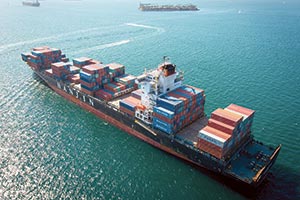Fleets Fret Over Claims on Bad Hanjin Cargo

This story appears in the Sept. 19 print edition of Transport Topics.
As Hanjin Shipping vessels finally arrive in the United States, some motor carriers are reluctant or refusing to accept cargo that might have been damaged because it could expose them to liability claims.
The concerns generally relate to two types of goods: first, perishables or other refrigerated items that spoiled while vessels were anchored in the Pacific Ocean, and second, sensitive items that could have been damaged from the heat, humidity or rust, such as electronics or electronic components.
“There is a legitimate concern about who is responsible for damage and what claims can be made against me, right or wrong,” said Curtis Whalen, executive director of American Trucking Associations’ Intermodal Motor Carriers Conference. “Whether or not you can win or lose doesn’t mean you won’t get sued for something.”
Hanjin filed for bankruptcy on Aug. 31 in South Korea and the United States. The U.S. Bankruptcy Court in New Jersey accepted the petition on Sept. 9 and instructed all interested creditors to file a claim in South Korea within the next few weeks.
Motor carriers that Hanjin didn’t pay for past drayage work are considered unsecured creditors, which means that they probably will see only cents on the dollar, according to legal experts.
However, many importers carry all-risk cargo insurance that likely will pay for damages more quickly than a lawsuit against a motor carrier, said Rick Bridges, vice president of Roanoke Trade in Schaumburg, Illinois. “The policy should extend to cover the physical damage during this event and be treated as any standard cargo claim,” he said.
Richard Furman, maritime attorney at Carroll, McNulty, Kull, said that those without cargo insurance are more likely to sue the freight forwarder or nonvessel operating common carrier, rather than the trucking company.
Nevertheless, Konoike-Pacific California Inc., a drayage provider specializing in refrigerated cargo, is not accepting any Hanjin business. Konoike-Pacific, or KPac, is concerned not only about the problem of unloading empty containers and chassis, but also that the responsible entity on the original bill of lading is bankrupt.
“The ‘what-ifs’ are what’s stopping us. What if I bring it over and it was rotten? I have to pay $30,000 to throw it away,” said Jeff Waite, KPac’s vice president of operations. “So it’s a cat-and-mouse game, and it will probably continue for a few months.”
KPac maintains three cold storage facilities in Southern California — two at the Port of Los Angeles and one in Long Beach. The motor carrier has 37 company drivers, Waite said.
“Even though we’re pretty well covered under our terms and conditions, anybody can sue anybody,” he said. “The costs to defend it are almost as bad as the claim itself, and it affects your margin, which is already tight. My belief is that if it’s trouble, stay away from it.”
Reliable Transportation Specialists Inc., based in Harvey, Illinois, is telling customers that it won’t accept any temperature-sensitive cargo unless the owner waives all liability claims beforehand. The motor carrier has 215 trucks providing inland drayage service in Atlanta, Chicago, Detroit, St. Louis, and Columbus, Ohio, and also serves the Port of Savannah. Reliable Transportation moves 400 to 500 Hanjin boxes per year and handled 17 dry loads since Aug. 31, company president Kevin Lhotak said.
“Hanjin reefers are just a claim waiting to happen. They can run low on fuel, sit out on the ocean for a week, get into the Port of Los Angeles and then [the container] is put on rail to Chicago, and I won’t know about it,” he said.
Lhotak said he’s personally inspecting all Hanjin bills of lading before he accepts any jobs.
“Overage, shortage and damage claims tend to flow downhill, and guess who is down the farthest? The motor carriers,” he added.
George Pezold, executive director of the Transportation and Logistics Council, said there also are heightened risks of economic loss for time-sensitive cargo. He argues that the uncertainty slows down the supply chain and, in turn, increases the probability that claims will be filed.
“You have items that have been ordered for a season — for example, Halloween. If you have containers full of masks and costumes and they get here in November, what are you going to do with it?” Pezold said.
Bridges said that all-risk cargo insurance does not cover these delays and loss of market claims, which means the cargo owner may have to write off the lost revenue.

